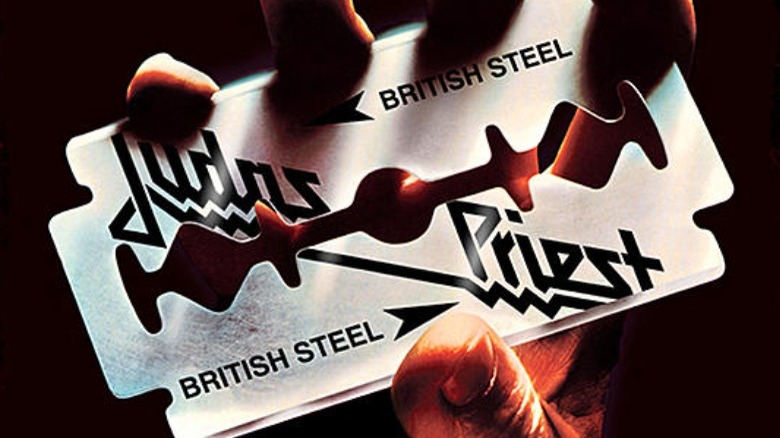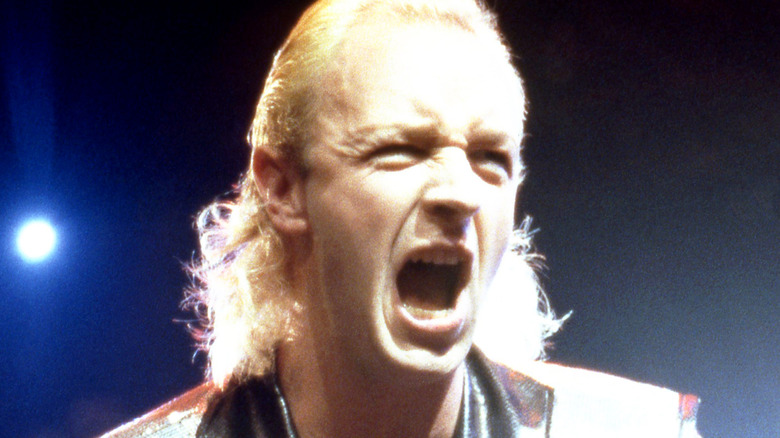Judas Priest From 1969 Beginnings To Metal Fame
Though they began as a progressive-rock-influenced hard rock band like so many others from England who broke out big in the 1970s, Judas Priest went on to pioneer a very specific, very hard, and very loud form of music. Formed in Birmingham in 1969, and solidifying its lineup by the mid-1970s with the addition of the leather-clad, growling but operatic vocalist Rob Halford and the two-guitar harmonic crunch of Glenn Tipton and K.K. Downing, Judas Priest became the one band most associated with heavy metal music — the sound, look, presentation, and attitude all developed organically. By the 1980s, and after the release of its landmark albums "British Steel," "Stained Class," and "Screaming for Vengeance," Judas Priest was one of the loudest and heaviest bands on the planet, rocking the brains and ears of millions of fans who couldn't get enough dark and hard-charging hits like "Breaking the Law," "Living After Midnight," and "You've Got Another Thing Comin'."
In 2022, Judas Priest received one of the biggest honors in music with its induction into the Rock and Roll Hall of Fame. Put on some leather pants, throw up some horns, and take a deep dive into five decades' worth of Judas Priest history.
The Judas Priest-Bob Dylan-Jesus Christ connection
Judas Priest, all chugging guitar riffs, thundering drums, and wailing vocals, doesn't sound remotely like the music of Bob Dylan, with its strummed acoustic guitars and inscrutable lyrics delivered in a meandering twang. But the hugely successful metal band is named after a deep cut by the Boomer poetry-pop hero, a story song with a dark and deadly plot that sounds like it could have come from a metal song.
According to American Songwriter, "The Ballad of Frankie Lee and Judas Priest" appears on Dylan's eighth LP, "John Wesley Harding" (from 1967), and it tells the tale of Frankie, who gets some money from Jonas to party in a den of ill repute and then dies in his friends' arms weeks later. Guitarist K.K. Downing suggested the band follow the lead of Earth, which renamed themselves Black Sabbath, and come up with something similarly sinister. Original bassist Bruno Stapenhill suggested "Judas Priest," from the Dylan song. "Which we all thought was good and people would remember it," original singer Al Atkins said.
But where did Dylan get the name "Judas Priest?" He didn't make it up. It was used as a TV-friendly curse word alternative in the early days of the medium in the mid-20th century, a censor-skirting exclamation used in lieu of the more controversial taking-the-Lord's-name exclamation of "Jesus Christ."
Judas Priest's punk experiment created modern metal
Punk rock and heavy metal are very different forms of music, but one may have greatly influenced the other, by way of Judas Priest, a heavy metal stalwart in the making looking to stay current and keep their music fresh.
In late 1977, punk hit big in the U.K., according to Revolver, with the emergence of anarchic, trouble-making, truth-to-power-speaking bands like the Sex Pistols and the Clash playing fast and loud, threatening to displace the previously preferred sound of the disenfranchised British, heavy metal. "Punk caught the ears of the record labels and the music press," singer Rob Halford told Classic Rock. "There was a very immediate alienation of things from the past." In response, Priest tried to capture the aggressive vibes of punk and incorporate them into the songs they were recording for their album "Stained Class." "We've always placed a lot of importance on what's going on, because it's what the kids want," guitarist Glenn Tipton said. "So we've always kept our ear to the ground."
Mixing metal with punk — and some recording ideas from veteran jazz-fusion producer Dennis MacKay — led to what would help define harder rock in the coming decade. "'Stained Class' completely re-invented metal," Thomas Gabriel Fischer of the metal band Celtic Frost said. "It presented a surgical, precise kind of metal, a prototype of thrash metal that I had never heard."
Judas Priest was sued over subliminal messaging
Judas Priest's 1978 album "Stained Class" included a cover of "Better by You, Better Than Me," a tune by the English rock group Spooky Tooth. In December 1985, more than seven years after Judas Priest released the song, according to Rolling Stone, 20-year-old James Vance and 18-year-old Ronald Belknap, best friends from Reno, Nevada (per Entertainment Weekly), spent several hours drinking alcohol and smoking marijuana. They listened to "Stained Class" throughout, and then each man felt compelled to fire a shotgun at themselves. The act instantly killed Belknap while Vance lived, enduring severe, appearance-altering injuries in advance of his death in three years' time.
Before he died, Vance and his mother and father sued Judas Priest and label CBS Records seeking $6.2 million, alleging that the band had placed secret, backward messages in "Better by You, Better Than Me" that convinced Vance and Belknap to take their own lives, such as "let's be dead," "try suicide," and "let's do it." Vance's attorneys presented the song forward and backward in the courtroom in an attempt to prove the existence of secret messages. Judas Priest singer Rob Halford took the witness stand, explaining that the phrases the two men heard were simply the sound of him exhaling. At the end of the 1990 trial, the judge cleared Judas Priest of any wrongdoing and found them not liable for the death and near-death of the demonstrably troubled young men.
If you or anyone you know is having suicidal thoughts, please call the National Suicide Prevention Lifeline by dialing 988 or by calling 1-800-273-TALK (8255).
That very metal logo came from an acclaimed artist and record label employee
Judas Priest used a series of typeface-based band logos on the covers of its first few albums, finally settling on a design they'd use pretty much forever after with its use on the jacket of their fourth studio LP, "Stained Class," in 1978. It's simple but eye-catching, "Judas Priest" rendered in a jagged, angular, script. According to the website of band guitarist K.K. Downing, that was the invention of Roslaw Szaybo, a graphic designer and art director who worked for Judas Priest's label, CBS Records. Inspired by some of the future-exploring lyrics on "Stained Class," Szaybo created a logo that looked like it came from years yet to come, influenced by science fiction, and wanted to make it look as if it had been electrified.
The band so enjoyed the work of Szaybo, also a painter and photographer, according to Revolver, that they enlisted him to design whole covers (per Twitter). The front of Judas Priest's 1980 album "British Steel" prominently features a hand gripping a razor blade emblazoned with the band logo. That was Szaybo's design, and he was the hand model for the shot, too. Born in Poland and rising to the position of chief artistic director at CBS Records, Szaybo's contributions were honored by his home country in 2018, with the Gold Medal for Merit to Culture," just before his death at age 85.
Rob Halford is an LGBT metal icon
Rob Halford identifies as a gay man, which MTV News said was well known throughout the music industry before he appeared on that outlet in 1998 to publicly disclose his orientation. Halford was estranged from Judas Priest at the time, and the revelation made waves, particularly in the heavy metal community, which the singer says was once oppressively anti-LGBT. "I was surrounded by homophobia, which still exists today," he told the Edmonton Journal in 2019. "There are places I can't go back to because I'll be stoned to death." According to his memoir, "Confess," Halford felt he had to keep his sexual preferences secret, and he sought anonymous encounters at truck stops. He told Yahoo! Entertainment that he was once arrested for seeking out a liaison at a men's public bathroom as part of an undercover police bust, but was let go because the precinct staff all recognized him — he paid a fine and the incident never reached the media.
Despite Halford not fully disclosing his sexual orientation in his early Judas Priest days, the band's music held clues. "The only one that was kind of an overt statement in all of those lyrics to me, personally, was "Raw Deal" where I talk about going to Fire Island in New York," he said, of the resort popular with gay men. "And then that end phrase of the song where I'm singing, 'love knoweth no laws.'"
Of motorcycles and machine guns
Judas Priest released the album "Killing Machine" in the U.K. in 1978, renamed "Hell Bent for Leather" for the U.S., making a title track out of a standout song. The group was still playing gigs in small rooms around the U.K. at the time, when he got an idea outside of a club one night. "We pulled up and there were bikers parked outside the venue," he told Goldmine. "I said out of the blue, 'It would be very cool if we could bring a motorcycle out during 'Hell Bent for Leather.'" Halford borrowed one of the bikers' rigs, rode it out onstage, and the crowd enjoyed it so much that it became a regular part of Judas Priest's stage show. It hasn't always been easy. In 1990, according to UCR, Halford fell off his Harley Davidson on stage and knocked himself temporarily unconscious. In 2011, he again took a tumble (albeit a minor one) during a show in Brazil, according to Metal Hammer.
The motorcycle isn't the only heavy metal at a Judas Priest show. While touring in the early '80s, Halford would fire an authentic machine gun, according to Goldmine. "I had this idea, at the end of 'Genocide,'" Halford explained. "I'd take the machine gun and fire into the crowd." A fire marshal had to come to arenas each night to sign off on the safety of the gun and carefully observe a stagehand load the firearm with blanks.
A huge Judas Priest fan joined Judas Priest
In 1992, after about two decades as the lead singer of Judas Priest, Rob Halford left the band for various personal and creative reasons, according to Rolling Stone. "I think it was important for me to do that." But the rest of Judas Priest soldiered on, faced with the difficult task of replacing its most visible and famous member. The man for the job was the closest thing the rest of Judas Priest could find to Rob Halford: a professional Halford impersonator.
According to Rolling Stone, singer Tim "Ripper Owens," who took his nickname from a Priest song, had fronted a Priest-influenced band called US Metal, a play on "British Steel," the name of a Priest album as well as a Priest cover band with which he'd performed. Some fans gave a tape of Owens performing to Priest drummer Scott Travis, who shared it with his bandmates, because by 1996, he'd secured an audition with the full group in Wales, which he aced.
Owens toured and recorded as the lead singer of Judas Priest until 2003, when Halford asked to return, according to the BBC. By then, Owens' story had inspired the Mark Wahlberg movie "Rock Star," and years later, after K.K. Downing had also left Judas Priest, according to Goldmine, he teamed up with the guitarist to form a new metal band called K.K.s Priest.
Laying down the law on Breaking the Law
"Breaking the Law" is probably Judas Priest's best-known song. No other single from the band charted higher in the U.K., while in the U.S., it was quoted and riffed on by cartoon metal heads Beavis and Butt-Head. And to think, it's a pointed meditation on the crumbling British economy of the early 1980s. "Judas Priest have never been a political band," singer Rob Halford wrote in "Confess: The Autobiography," "But this song, was without question, a slice of acute social commentary." Industrial and manufacturing sectors were hurting, with factory closures and widespread job losses around the bend, creating a sense of hopelessness among British youth. "Writing the lyrics for 'Breaking the Law,' I tried to put myself in the mind of a jobless young bloke at his wits' end," Halford said.
The rough edges of the song smoothed out to the point where Judas Priest could create and perform a parody of the song on a 2014 episode of "The Simpsons." After Homer gets nailed for illegal downloading, he and his family camp out at the Swedish consulate, and authorities try to drive them out by hiring Judas Priest to play "Respecting the Law." A Swedish official loves it, because he loves all "death metal," and days later, producers of "The Simpsons" apologized to Judas Priest via an opening sequence "chalkboard gag" for labeling them a "death metal" band when they are, in fact, a heavy metal band, according to The Guardian.
Judas Priest has shed a few members
By the time Judas Priest recorded its most critically acclaimed album, 1980's "British Steel," no original members of the band remained. According to UCR, only singer Al Atkins made it a year past the group's formation in 1970, when guitarist K.K. Downing, bassist Ian Hill, and drummer John Ellis joined. By 1973, Atkins and Ellis were gone, and singer Rob Halford and drummer John Hinch were in. Guitarist Glenn Tipton came aboard in 1974, and a half dozen or so guys came and went before the lineup solidified with Halford, Downing, Tipton, Hill, and drummer Dave Holland, who'd sit behind the kit from 1979 to 1989.
Not-original members but peak-era guitarists Glenn Tipton and K.K. Downing would stick with the band well into the 21st century. According to The Guardian, in 2018, Tipton announced that he was suffering from the effects of the late stages of Parkinson's disease, a degenerative neurological and physical condition that left him unable to play guitar at a professional level. He'd been diagnosed 10 years prior but lived with the condition until he had to retire from touring with Judas Priest. Downing's exit had to do with a golf course. According to Goldmine, he left in 2010 because he needed to manage a course he owned; he claims that's a lie spread by his former bandmates. He just didn't want to go on a farewell tour.
Judas Priest is finally going into the Rock and Roll Hall of Fame
Most bands don't last as long as Judas Priest has — more than 50 years across various lineups and incarnations — and they don't rack up as many honors and accolades, either. According to the Recording Industry Association of America, Judas Priest has received awards for 12 gold or platinum-selling albums (sales of 500,000 and one million in the U.S., respectively), took home a Grammy Award (and scored five more nominations), shaped the sound and direction of heavy metal, and recorded classic rock radio staples like "You've Got Another Thing Comin'" and "Living After Midnight." But perhaps the highest honor in rock music is one the band didn't receive until 2022.
When the Rock and Roll Hall of Fame unveiled its 2022 class of inductees, Judas Priest made the list. However, they didn't make it in via the usual method of a nominated act that garnered a plurality of votes. Instead, they were included by way of the "Musical Excellence" category, a designation the Rock Hall uses to automatically and directly induct whoever it deems worthy. It was probably the most effective way for Judas Priest to make it into the Hall, which has very few members in terms of heavy metal acts. According to Billboard, Judas Priest became eligible for induction way back in 2000 and only made it as far as the voting ballot in 2018, 2020, and 2022, before the Rock Hall let them in.










